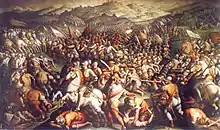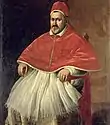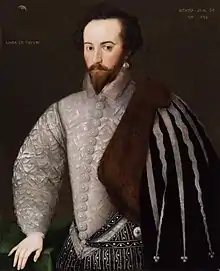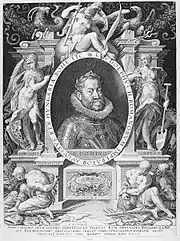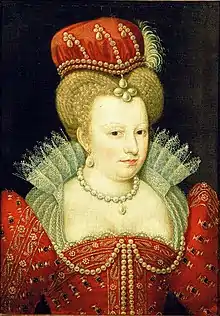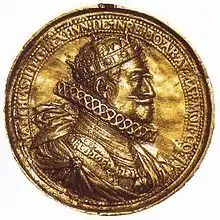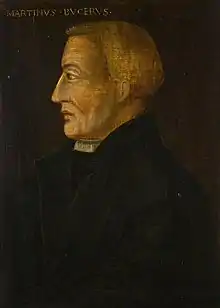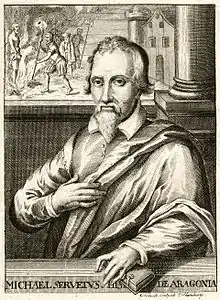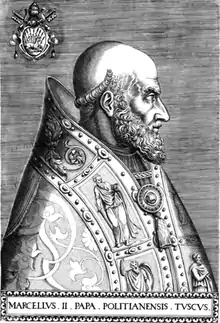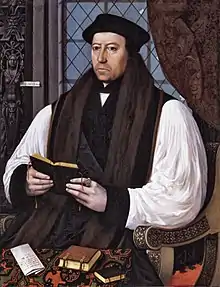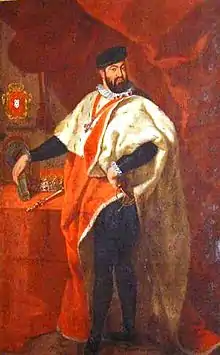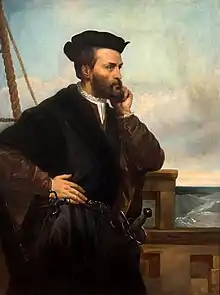1550s
The 1550s decade ran from January 1, 1550, to December 31, 1559.
| Millennium: | 2nd millennium |
| Centuries: | |
| Decades: | |
| Years: | |
| Categories: |
|
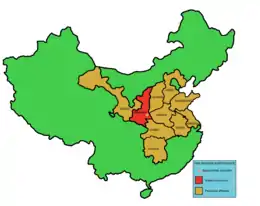
January 23, 1556: Shaanxi earthquake, devastation kills 830,000 in China.
Events
1550
January–June
- January 6 – Spanish Captain Hernando de Santana founds the city of Valledupar, in modern-day Colombia.
- February 8 – Pope Julius III succeeds Pope Paul III as the 221st pope.
- March 12 – Arauco War: Battle of Penco – Several hundred Spanish and indigenous troops under the command of Pedro de Valdivia defeat an army of 60,000 Mapuche in modern-day Chile.
- March 12 – Acapulco is founded by 30 families sent from Mexico City
- March 24 – "Rough Wooing": England and France sign the Treaty of Boulogne, by which England withdraws from Boulogne in France and returns territorial gains in Scotland.[1]
- March 29 – Sherborne School in England is refounded by King Edward VI.
- April 16 – The Valladolid debate on the rights and treatment of indigenous peoples of the Americas by their Spanish conquerors opens at the Colegio de San Gregorio in Valladolid, Castile.
- June 12 – The city of Helsinki, Finland (belonging to Sweden at this time) is founded by King Gustav I of Sweden.
July–December
- July (at least) – John Dee finishes his studies at the Old University of Leuven.[2]
- July 7 – Chocolate is introduced to Europe.
- July 21 – The Society of Jesus (Jesuits) is approved by Pope Julius III.
- October 2 – Battle of Sauðafell in Iceland: Daði Guðmundsson of Snóksdalur defeats the forces of Catholic Bishop Jón Arason who is captured and executed, resulting in Iceland becoming fully Protestant.
Date unknown
- Altan Khan crosses the Great Wall of China and besieges Beijing, burning the suburbs.
- The summit level canal between the Alster and the Trave in Germany ceases to be navigable.[3]
- The first grammatical description of the French language is published by Louis Maigret.
- The first book in Slovene, Catechismus, written by Protestant reformer Primož Trubar, is printed in Schwäbisch Hall, Holy Roman Empire.[4]
- Nostradamus' first almanac is written.
- Approximate date – The discovery of silver at Zacatecas and Guanajuato in Mexico stimulates silver rushes.
1551
January–June
- January–February – Macarius, Metropolitan of Moscow, and Tsar Ivan IV of Russia preside over the reforming Stoglavy Synod ("Hundred-Chapter") church council.[5] A calendar of the saints and an ecclesiastical law code (Stoglav) are introduced.
- January 11 – Ketumati, Burma, is conquered by Bayinnaung.
- May 1 – The Council of Trent reconvenes by order of Pope Julius III.[6]
- May 12 – The National University of San Marcos is founded in Lima (Peru), being the first officially established university in the Americas.
July–December
- By July – Fifth and last outbreak of sweating sickness in England. John Caius of Shrewsbury writes the first full contemporary account of the symptoms of the disease.
- July – Invasion of Gozo: Ottoman Turks and Barbary pirates invade the Mediterranean island of Gozo, enslaving all inhabitants (estimated at 5,000 to 6,000) and transporting them to Tarhuna Wa Msalata (in modern-day Libya).[7]
- August 15 – The Siege of Tripoli ends, with the Knights of Malta surrendering Tripoli to the Ottoman Empire.
- September 21 – The Royal and Pontifical University of Mexico is founded in Mexico City (Mexico), being the second officially established university in the Americas.
- September 30 – Tainei-ji incident: A coup in Yamaguchi, by the military establishment of the Ōuchi clan, forces their lord Ōuchi Yoshitaka to commit suicide, and the city is burned.
- October 11 – John Dudley, Earl of Warwick, de facto Lord Protector of the Kingdom of England, is created Duke of Northumberland.[8]
Date unknown
- Qizilbash forces under the command of Tahmasp I raid and destroy the cave monastery of Vardzia in Georgia.
- In Henan province, China, during the Ming dynasty, a severe frost in the spring destroys the winter wheat crop. Torrential rains in mid summer cause massive flooding of farmland and villages (by some accounts submerged in a metre of water). In the fall, a large tornado demolishes houses and flattens much of the buckwheat in the fields. Famine victims either flee, starve, or resort to cannibalism. This follows a series of natural disasters in Henan in the years 1528, 1531, 1539, and 1545.
- In Slovakia, Guta (modern-day Kolárovo) receives town status.
- Portugal founds a sugar colony at Bahia.
- Juan de Betanzos begins to write his Narrative of the Incas.
- The new edition of the Genevan psalter, Pseaumes octantetrois de David, is published, with Louis Bourgeois as supervising composer, including the first publication of the hymn tune known as the Old 100th.
1552
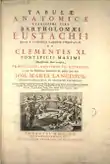
Bartolomeo Eustachi completes his Tabulae anatomicae.
January–June
- January 15 – Henry II of France and Maurice, Elector of Saxony, sign the Treaty of Chambord.[9]
- February 12 – Pedro de Valdivia founds the Chilean city of Valdivia, as Santa María la Blanca de Valdivia.
- February 24 – The privileges of the Hanseatic League are abolished in England.
- March – The Act of Uniformity imposes the Protestant Book of Common Prayer on England.
- March 26 – Guru Amar Das becomes the Third Sikh Guru.
- April – War breaks out between Henry II of France and Emperor Charles V. Henry invades the Duchy of Lorraine, and captures Toul, Metz and Verdun.
- April 11 – Metz Cathedral is consecrated.
- April 16 – Pedro de Valdivia founds the city of La Imperial, Chile.
- May – Maurice, Elector of Saxony, captures Augsburg, and almost seizes Charles V, Holy Roman Emperor at Innsbruck, leading to the suspension of the Council of Trent.
July–December
- July 6–July 9 – In Hungary, Drégely Castle is attacked by the Ottoman Empire. Captain György Szondy and c. 140 soldiers in the castle die, after 4 days of fighting against 8,000 Turkish raiders.
- August 2
- John Frederick, Elector of Saxony and Philipp I of Hesse, taken prisoner by Charles V in 1546, are released.
- The Peace of Passau revokes the Augsburg Interim of 1548, and promises religious freedom to the Protestant princes.
- September – In Hungary, captain István Dobó commands the breaking of the Siege of Eger, led by Kara Ahmed Pasha of the Ottoman Empire.
- September 24 – The Debatable Lands on the border of England and Scotland are divided between the two kingdoms by a commission creating the Scots' Dike in an unsuccessful attempt to halt lawlessness here, but giving both countries their modern borders.
- October 2 – The Khanate of Kazan falls to troops of Ivan IV of Russia.
Date unknown
- In the Persian Gulf, the Ottoman Empire Red Sea Fleet attacks the Portuguese stronghold of Hormuz, but fails to capture it.[10]
- The Ottoman's capture the city of Temesvar.
- In Italy, Bartolomeo Eustachi completes his Tabulae anatomicae, presenting his discoveries on the structure of the inner ear and heart,[11] although, for fear of the Inquisition, it will not be published until 1714.
- King Edward VI of England founds 35 grammar schools by royal charter,[1] including Shrewsbury; Leeds Grammar School is also established.
1553
January–June
- May – The first Royal Charter is granted to St Albans, in England.
- June – The first of the five Battles of Kawanakajima, the "Battle of the Fuse," commences in Japan between Takeda Shingen of Kai Province and Uesugi Kenshin of Echigo Province, part of a major series of conflicts during the Japanese Sengoku Period.
- June 26 – Two new schools, Christ's Hospital[12][13] and King Edward's School, Witley, are created by Royal Charter in accordance with the will of King Edward VI of England; St Thomas' Hospital, London, in existence since the 12th century, is named in the same charter.[14]
July–December
- July 9 – Battle of Sievershausen: Prince-elector Maurice of Saxony defeats the Catholic forces of Margrave Albert of Brandenburg-Kulmbach. Maurice is mortally wounded.[15]
- July 10 – Four days after the death of her cousin King Edward VI of England, Lady Jane Grey is proclaimed Queen of England – a position she holds for the next nine days.[16]
- July 19 – The Lord Mayor of London proclaims Mary I the rightful Queen, following a change of allegiance by the Privy Council; Lady Jane Grey voluntarily abdicates.[17]
- August – English explorer Richard Chancellor enters the White Sea and reaches Arkhangelsk, going on to the court of Ivan IV of Russia, opening up trade between England and Russia.
- August 3 – Queen Mary I of England arrives in London from East Anglia.
- August 18 – John Dudley, 1st Duke of Northumberland, is tried and convicted of treason for his role in putting his daughter-in-law, Lady Jane Grey, on the throne.[18]
- September – Anglican bishops in England are arrested, and Roman Catholic bishops are restored.
- October 6 – Şehzade Mustafa, oldest son of Suleiman the Magnificent, is executed in Konya by order of his father.[19]
- September 23 – The Sadians consolidate their power in Morocco, by defeating the last of their enemies.
- October 27 – Geneva's governing council burns Michael Servetus at the stake, as a heretic.
- December 25 – Battle of Tucapel: Mapuche rebels under Lautaro defeat the Spanish conquistadors, and execute Pedro de Valdivia, the first Royal Governor of Chile.
Date unknown
- Tonbridge School is founded by Sir Andrew Judde, under letters patent of Edward VI of England.
- The xiii Bukes of Eneados of the famose Poete Virgill, the first complete translation of any major work of classical antiquity into one of the English languages, is published in London.
- In Ming Dynasty China:
- The addition of a new section of the Outer City fortifications is completed in southern Beijing, bringing the overall size of Beijing to 18 square miles (4662 hectares).
- Shanghai is fortified for the first time.
January–June
- January 5 – A great fire breaks out in Eindhoven, Netherlands.
- January 11 – A Spanish army is defeated by local Mapuche-Huilliches as it tries to cross Bueno River in Southern Chile.[20]
- January 12 – Bayinnaung is crowned king of the Burmese Taungoo Dynasty.
- January 25 – São Paulo, Brazil, is founded.[21]
- February 9 – Thomas Wyatt surrenders to government forces in London.[22]
- February 12 – After claiming the throne of England the previous year, Lady Jane Grey is beheaded for treason.
- March 18 – Princess Elizabeth is imprisoned in the Tower of London.
- April 12 – Mary of Guise becomes Regent of Scotland.
July–December
- July 23–25 – Queen Mary I of England marries King Philip of Naples, the only son of Charles V, Holy Roman Emperor, in Winchester, England.[23]
- August 2 – Battle of Marciano: Senese–French forces are defeated by the Florentine–Imperial army.
- August 12 – Battle of Renty: French forces led by Francis, Duke of Guise turn back an invasion of Picardy, by Charles V.
- November – English captain John Lok voyages to Guinea.[24][25]
Date unknown
- Mikael Agricola becomes the bishop of Turku.
- Saadi conquers the Kingdom of Fez.
- Exact center year of Counter Reformation.
- The name of the beer brewed by New Belgium Brewing Company is based on a recipe from this date, called "1554."
- Luso-Chinese agreement: Portugal reaches an agreement with the Ming Dynasty of China, to be allowed to legally trade in the province of Guangdong.
- Rao Surjan Singh becomes ruler of Bundi.
1555
January–June
- January 22 – The Kingdom of Ava in Upper Burma falls.
- February 2 – The Diet of Augsburg begins.
- February 4 – John Rogers suffers death by burning at the stake at Smithfield, London, the first of the Protestant martyrs of the English Reformation under Mary I of England.[22]
- February 8 – Laurence Saunders becomes the second of the Marian Protestant martyrs in England, being led barefoot to his death by burning at the stake in Coventry.
- February 9 – Rowland Taylor, Rector of Hadleigh, Suffolk, and John Hooper, deposed Bishop of Gloucester, are burned at the stake in England.
- April 10 – Pope Marcellus II succeeds Julius III as the 222nd pope. He will reign for 22 days.[26]
- April 17 – After 18 months of siege, the Republic of Siena surrenders to the Florentine–Imperial army.
- May 23 – Pope Paul IV succeeds Marcellus II, as the 223rd pope.[27]
- May 25 – Jeanne d'Albret succeeds Henri II on the Navarrese throne.[28]
- June 1 – The Treaty of Amasya between the Ottoman Empire and Safavid Persia concludes the Ottoman–Safavid War (1532–1555).
July–December
- July 12 – Pope Paul IV creates the Roman Ghetto, the first Jewish ghetto in Rome.
- September 25 – The Peace of Augsburg is signed between Charles V, Holy Roman Emperor, and the Lutheran Schmalkaldic League, establishing the principle Cuius regio, eius religio, that is, rulers within the Empire can choose the religion of their realm.
- September – The 1555 Kashmir earthquake causes widespread destruction and death in Kashmir, India.[29]
- October 16
- Battle of Miyajima Island: Mori Motonari defeats Sue Harukata.
- Two of the Oxford Martyrs, Hugh Latimer and Nicholas Ridley, are burned at the stake in England.
- October 25 – Charles V abdicates as Holy Roman Emperor and is succeeded by his brother Ferdinand.
Date unknown
- Russia breaks a 60-year-old truce with Sweden by attacking Finland.
- Humayun resumes rule of the Mughal Empire.
- Second Battle of Panipat: Bairam Khan defeats Hindu forces.
- The Adal Sultanate in the Horn of Africa collapses.
- The Muscovy Company is chartered in England to trade with Muscovy[30] and Richard Chancellor negotiates with the Tsar.
- English captain John Lok returns from Guinea, with five Africans to train as interpreters for future trading voyages.
- Richard Eden publishes The Decades of the Newe Worlde or West India, a translation into English of parts of Pietro Martire d'Anghiera's De orbe novo decades, the Gonzalo Fernández de Oviedo y Valdés work Natural hystoria de las Indias and others, urging his countrymen to follow the lead of Spain in exploring the New World;[31] the work includes the first recorded use in English of the country name 'China'.
- Establishment in England of the following grammar schools: Boston Grammar School, Gresham's School at Holt, Norfolk (founded by Sir John Gresham) and Ripon Grammar School (re-foundation).
- William Annyas becomes the Mayor of Youghal, Ireland, the first Jew to hold such a position in Ireland.[32]
- John Dee is charged, but cleared, of treason in England.
- Orlande de Lassus' first book of madrigals is published, in Antwerp.
- Lorenzo de' Medici orders a violin from Andrea Amati of Cremona.
1556
January–June
- January 16 – Charles V, having already abdicated as Holy Roman Emperor, resigns the Kingdom of Spain in favour of his son, Philip II, and retires to a monastery.[33]
- January 23 – The Shaanxi earthquake, the deadliest earthquake in history, occurs with its epicenter in Shaanxi province, China; 830,000 people may have been killed.
- February 5 – Truce of Vaucelles: Fighting temporarily ends between France and Spain.
- February 14
- Akbar the Great ascends the throne of the Mughal Empire at age 13; he will rule until his death in 1605, by which time most of the north and centre of the Indian subcontinent will be under his control.
- Archbishop of Canterbury Thomas Cranmer is declared a heretic.
- February 22 (approx.) – Sophia Jagiellon marries Henry V, Duke of Brunswick-Lüneburg.[34]
- March 21 – In Oxford, Thomas Cranmer is burned at the stake for treason.
July–December
- November – The Truce of Vaucelles collapses, and war resumes between Henry II of France and Philip II of Spain.
- November 5 – Second Battle of Panipat: Fifty miles north of Delhi, a Mughal army defeats the forces of Hemu, to ensure Akbar the throne of India.
Date unknown
- The kings of Spain take control of the Flanders region, including what is now the French département of Nord.
- The Plantations of Ireland are started in King's County (now County Offaly) and Queen's County (now County Laois), the earliest attempt at systematic ethnic cleansing in Ireland, by the Roman Catholic ruler Queen Mary I of England.
- Future King Prince John, younger son of King Gustav I of Sweden becomes Duke of Finland.
- Ivan the Terrible conquers Astrakhan, opening the Volga River to Russian traffic and trade.
- The Welser banking families of Augsburg lose colonial control of Venezuela.
- Lorenzo Priuli becomes Doge of Venice.
- The false Martin Guerre appears in the French village of Artigat.
- The first printing press in India is introduced by Jesuits, at Saint Paul's College, Goa.
1557
January–June
- March – The Takeda clan besiege Katsurayama Castle in eastern Japan. The siege ends with the last stand of the castle garrison, and the complete destruction of Katsurayama, allowing the Takeda to further expand in Shinano Province.
- April 12 – The Spanish settlement of Cuenca, Ecuador, is founded.
- April 30 – Arauco War – Battle of Mataquito: Spanish forces of Governor Francisco de Villagra launch a dawn surprise attack against the Mapuche (headed by their toqui Lautaro), in present-day Chile.
- By June – The 1557 influenza pandemic has spread, probably from China, to Europe.
- June 7 – Mary I of England joins her husband Philip II of Spain, in his war against France.
- June 10 – The New Testament of the Geneva Bible, a Protestant Bible translation into English (produced under the supervision of William Whittingham, and printed in Roman type), is published in Geneva.
July–December
- August 10 – Battle of St. Quentin: French forces under Marshal Anne de Montmorency are decisively defeated by the Spanish and English under Duke Emanuel Philibert of Savoy. Montmorency himself is captured, but Philip II refuses to press his advantage, and withdraws to the Netherlands.
- September 11–October 8 – The Colloquy of Worms convenes.
- October 23 – Mohammed al-Shaykh is assassinated.
- October 27 – Emperor Ōgimachi accedes to the throne of Japan.
Date unknown
- Özdemir Pasha conquers the Red Sea port of Massawa for the Ottoman Empire.
- Cossack chieftain Dimitrash tries to take Azov.
- With the permission of the Ming dynasty government of China, and for the benefit of both Western and Eastern merchants, the Portuguese settle in Macau (retroceded in 1999). Direct Sino-Portuguese trade has existed since 1513, but this is the first official legal treaty port on traditional Chinese soil, that will form a long-term Western settlement.
- Spain becomes bankrupt, throwing the German banking houses into chaos.[35]
- Gonville and Caius College, Cambridge, is refounded by John Caius.[36]
- The following schools are founded in England:
- Brentwood School, Essex, by Sir Antony Browne.
- Hampton School, Hampton, London, by Robert Hammond.
- Repton School, by Sir John Port.
- Welsh-born mathematician Robert Recorde publishes The Whetstone of Witte in London, containing the first recorded use of the equals sign and also the first use in English of plus and minus signs.[37]
- German adventurer Hans Staden publishes a widely translated account of his detention by the Tupí people of Brazil, Warhaftige Historia und beschreibung eyner Landtschafft der Wilden Nacketen, Grimmigen Menschfresser-Leuthen in der Newenwelt America gelegen ("True Story and Description of a Country of Wild, Naked, Grim, Man-eating People in the New World, America").
1558
January–June
- January 7 – French troops, led by Francis, Duke of Guise, take Calais, the last continental possession of the Kingdom of England, in the Siege of Calais.
- January 22 – The Livonian War begins.
- February 2 – The University of Jena is founded in Thuringia, Germany.
- February 5 – Arauco War: Pedro de Avendaño, with sixty men, captures Caupolicán (the Mapuche Gran Toqui), who is leading their first revolt against the Spanish Empire (near Antihuala), encamped with a small band of followers.
- March 8 – The city of Pori (Swedish: Björneborg) was founded by Duke John on the shores of the Gulf of Bothnia.[38]
- April 24 – Mary, Queen of Scots, marries Francis, Dauphin of France, at Notre Dame de Paris.
July–December
- July 13 – Battle of Gravelines: In France, Spanish forces led by Lamoral, Count of Egmont defeat the French forces of Marshal Paul de Thermes.
- July 18 – The city of Tartu, capital of the Bishopric of Dorpat (in modern-day Estonia) surrenders to Russia.
- October 17 – Postal history of Poland: King Sigismund II Augustus appoints an Italian merchant living in Kraków to organise a consolidated postal service in Poland, the origin of Poczta Polska.
- November 17 – The Elizabethan era begins in England: Catholic Queen Mary dies, and is succeeded by her younger Protestant half-sister Elizabeth, who will rule for 44 years.
Unknown
- John Knox's attack on female rulers, The First Blast of the Trumpet Against the Monstruous Regiment of Women, is published anonymously from Geneva.[39]
- English explorer Anthony Jenkinson travels from Moscow to Astrakhan and Bukhara.[40] He is the first Englishman to note that the Amu Darya changed course, to start flowing into the Aral Sea.[41]
- Queen Elizabeth I of England grants rest and refreshment to pilgrims and travellers who pass by the Holy Well Spring at Malvern in England.
Ongoing
- 1557 influenza pandemic.
1559
January–June
- January 15 – Elizabeth I of England is crowned, in Westminster Abbey.[42]
- February 27 – Queen Elizabeth I of England establishes the Church of England, with the Act of Uniformity 1558 and the Act of Supremacy 1558. The Oath of Supremacy is reinstated.
- March 23 – Emperor Gelawdewos of Ethiopia, defending his lands against the invasion of Nur ibn Mujahid, Sultan of Harar, is killed in battle. His brother, Menas, succeeds him as king.
- April 2–3 – Peace of Cateau Cambrésis: France makes peace with England and Spain, ending the Italian War of 1551–59. France gives up most of its gains in Italy (including Savoy), retaining only Saluzzo, but keeps the three Lorraine bishoprics of Metz, Toul, and Verdun, and the formerly English town of Calais.
- May 2 – John Knox returns from exile to Scotland, to become the leader of the beginning Scottish Reformation.
- May 13 – At Basel, the body of Dutch Anabaptist leader David Joris is exhumed and burned, following his posthumous conviction of heresy.
- June 2 – A royal edict in France makes heresy punishable by death.
- June 11 – Scottish Reformation: A Protestant mob, incited by the preaching of John Knox, sacks St Andrews Cathedral.
- June 22 – King Philip II of Spain and the 14-year-old Elisabeth of Valois are married in Spain, having married by proxy in January.[43] On June 30, the bride's father, King Henry II of France, is fatally injured in a jousting accident at the celebrations.
July–December
- July 10 – 15-year old Francis II becomes King of France following the death of his father, Henry II.[44][45] Members of the House of Guise and the new king's mother Catherine de' Medici dispute control over the kingdom.
- July 31 – Pope Paul IV authorizes the creation of the University of Douai (which will later become the University of Lille).[46]
- August 15 – Led by Don Tristán de Luna y Arellano, a Spanish missionary colony of 1,500 men, on 13 ships, arrives from Vera Cruz at Pensacola Bay, founding the oldest European settlement in the mainland U.S. (St. Augustine is founded in 1565.)
- September 4 – Gorkha state is established by Dravya Shah, beating local Khadka kings, which is the origin of the current country of Nepal.
- September 19 – Just weeks after arrival at Pensacola, the Spanish missionary colony is decimated by a hurricane that kills hundreds, sinks five ships, with a galleon, and grounds a caravel; the 1,000 survivors divide to relocate/resupply the settlement, but suffer famine & attacks, and abandon the effort in 1561.
- September 21 – The 15-year-old King Francis II of France is crowned at Reims. The crown is too heavy for him, and has to be held in place by his nobles.[47]
- December 25 – Pope Pius IV succeeds Pope Paul IV, as the 224th pope.
Date unknown
- End of Reformation according to many historians.[48]
- The University of Geneva is founded by John Calvin.[49]
- John Calvin publishes the final edition of the Institutes of the Christian Religion.[50]
- Oda Nobunaga wins control of his native province of Owari.
- Margaret of Parma becomes Governor of the Netherlands, in place of her brother, King Philip II of Spain.
- Jean Nicot, French ambassador to Portugal 1559–61, describes the medicinal properties of tobacco, which he introduces in the form of snuff to the French court.[51]
- Pope Paul IV promulgates the Pauline Index, an early version of the Index Librorum Prohibitorum.
Births
1550
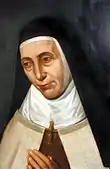
Anne of Saint Bartholomew
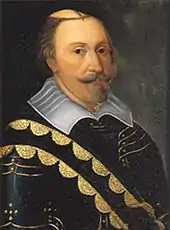
King Charles IX of Sweden
- January 18 – Tsugaru Tamenobu, Japanese daimyō (d. 1607)
- February 1 – John Napier, Scottish mathematician (d. 1617)
- February 17 – Philip of Hohenlohe-Neuenstein, Dutch army commander (d. 1606)
- February 22 – Charles de Ligne, 2nd Prince of Arenberg (d. 1616)
- March 6 – Michelangelo Naccherino, Italian sculptor (d. 1622)
- March 8 – William Drury, English politician (d. 1590)
- April 5 – Andrés Pacheco, Spanish churchman and theologian (d. 1626)
- April 9 – Giulio Pace, Italian philosopher (d. 1635)
- April 12 – Edward de Vere, 17th Earl of Oxford, Lord Great Chamberlain of England (d. 1604)
- April 16 – Francis Anthony, English apothecary and physician (d. 1623)
- April 18 – Alessandro Pieroni, Italian painter (d. 1607)
- May 8 – John I, Count Palatine of Zweibrücken (d. 1604)
- May 25 – Camillus de Lellis, Italian saint and nurse (d. 1614)
- June 16 – Marie Eleonore of Cleves, Duchess consort of Prussia (1573–1608) (d. 1608)
- June 27 – King Charles IX of France (d. 1574)[52]
- June 28 – Johannes van den Driesche, Flemish Protestant clergyman and scholar (d. 1616)
- July 3 – Jacobus Gallus, Slovenian composer (d. 1591)
- August 6 – Enrico Caetani, Italian Catholic cardinal (d. 1599)
- August 8 – Petrus Gudelinus, Belgian jurist (d. 1619)
- September 1 – Alonso Pérez de Guzmán, 7th Duke of Medina Sidonia, Spanish admiral (d. 1615)
- September 10 – Alonso de Guzmán El Bueno, 7th Duke of Medina Sidonia, commander of the Spanish Armada (d. 1615)
- September 17 – Pope Paul V (d. 1621)[53]
- September 29 – Joachim Frederick of Brieg, Duke of Wołów (1586-1602) (d. 1602)
- September 30 – Michael Maestlin, German astronomer and mathematician (d. 1631)
- October 1 – Anne of Saint Bartholomew, Spanish Discalced Carmelite nun (d. 1626)
- October 4 – King Charles IX of Sweden (d. 1611)[54]
- October 8 – Antonio Zapata y Cisneros, Spanish cardinal (d. 1635)
- October 25 – Ralph Sherwin, English Roman Catholic priest (martyred 1581)
- October 28 – Stanislaus Kostka, Polish saint (d. 1568)
- November 1 – Henry of Saxe-Lauenburg, Prince-Archbishop of Bremen, Prince-Bishop of Osnabruck and Paderborn (d. 1585)
- November 6 – Karin Månsdotter, Swedish queen (d. 1612)
- December 2 – Antonio Fernández de Córdoba y Cardona, Spanish diplomat (d. 1606)
- December 6 – Orazio Vecchi, Italian composer (d. 1605)
- December 21
- December 22 – Cesare Cremonini, Italian philosopher (d. 1631)
- December 28 – Vicente Espinel, Spanish writer (d. 1624)
- December 29 – García de Silva Figueroa, Spanish diplomat and traveller (d. 1624)
- December 31 – Henry I, Duke of Guise (d. 1588)
- date unknown
- Jacob ben Isaac Ashkenazi, Polish Jewish author (d. 1625)
- Willem Barentsz, Dutch navigator and explorer (d. 1597)
- Anselmus de Boodt, Belgian mineralogist and physician (d. 1632)
- Matthijs Bril, Flemish painter (d. 1583)
- Helena Antonia, Austrian court dwarf (d. 1595)
- Sarsa Dengel, Emperor of Ethiopia (d. 1597)
- Hugh O'Neill, Earl of Tyrone, Irish rebel (d. 1616)
- probable
- Robert Balfour, Scottish philosopher (d. 1625)
- Henry Barrowe, English Puritan and Separatist (d. 1593)
- Emilio de' Cavalieri, Italian composer (d. 1602)
- Cornelis Corneliszoon, Dutch inventor of the sawmill (d. c. 1600)
- Philip Henslowe, English theatrical entrepreneur (d. 1616)
- Brianda Pereira, Azorean Portuguese heroine (d. 1620)
1551
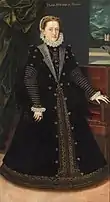
Maria Anna of Bavaria
- January 5 – Jean Chapeauville, Belgian theologian and historian (d. 1617)
- January 14 – Abu'l-Fazl ibn Mubarak, Grand vizier of the Mughal emperor Akbar (d. 1602)
- January 26 – Robert Dormer, 1st Baron Dormer, English politician (d. 1616)
- February 2 – Nicolaus Reimers, German astronomer (d. 1600)
- March 9 – Alessandro Alberti, Italian painter (d. 1596)
- March 21 – Maria Anna of Bavaria (d. 1608)
- March 30 – Salomon Schweigger, German theologian (d. 1622)
- April 9 – Peter Monau, German physician (d. 1588)
- April 30 – Jacopo da Empoli, Italian painter (d. 1640)
- May 2 – William Camden, English historian (d. 1623)[55]
- May 8 – Thomas Drury, English government informer and swindler (d. 1603)
- May 17 – Martin Delrio, Flemish theologian and occultist (d. 1608)
- September 19 – King Henry III of France (d. 1589)[56]
- October 4 – Philip VI, Count of Waldeck (1567–1579) (d. 1579)
- October 8 – Giulio Caccini, Italian composer (d. 1618)
- October 26 – Charlotte de Sauve, French courtesan (d. 1617)
- November 11 – Giovanni I Cornaro, Doge of Venice (d. 1629)
- date unknown
- Bhai Gurdas – original scribe of Guru Granth Sahib
- George Tuchet, 1st Earl of Castlehaven (d. 1617)
- Fausto Veranzio, Dalmatian/Croatian polymath, bishop, humanist (d. 1617)
- Job of Pochayiv, Ukrainian Christian Orthodox Saint (d. 1651)
- probable
- Patrick Galloway, Moderator of the General Assembly of the Church of Scotland (d. c.1626)
- Boris Godunov, Tsar of Russia (d. 1605)
- Stanisław Stadnicki, Polish nobleman (d. 1610)
1552
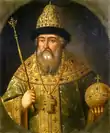
Vasili IV of Russia
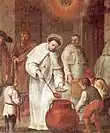
Simón de Rojas
- January 14 – Alberico Gentili, Italian jurist (d. 1608)
- January 22 – Walter Raleigh, English explorer (d. 1618)[57]
- February 1 – Edward Coke, English colonial entrepreneur and jurist (d. 1634)
- February 8 – Agrippa d'Aubigné, French poet and soldier (d. 1630)[58]
- February 19 – Melchior Klesl, Austrian statesman and cardinal (d. 1630)
- February 20 – Sengoku Hidehisa, Japanese daimyō (d. 1614)
- February 25 – Magdalene of Lippe, Countess of Lippe by birth, and by marriage Landgravine of Hesse-Darmstadt (d. 1587)
- February 28 – Joost Bürgi, Swiss clockmaker and mathematician (d. 1632)
- March 1 – Anna of Cleves, Duchess of Jülich-Cleves-Berg by birth and by marriage Countess Palatine of Neuburg (d. 1632)
- March 18 – Polykarp Leyser the Elder, German theologian (d. 1610)
- March 20 – Christoph, Count of Hohenzollern-Haigerloch (d. 1592)
- April 20 – Frederick IV of Liegnitz, German noble (d. 1596)
- May 8 – Petrus Ryff, Swiss scientist (d. 1629)
- May 12 – Edmund Bowyer, English politician (d. 1627)
- June 2 – Raja Wodeyar I, King of Mysore (d. 1617)
- June 8 – Gabriello Chiabrera, Italian poet (d. 1638)
- June 17 – John George of Ohlau, Duke of Oława and Wołów (1586-1592) (d. 1592)
- June 29 – Elizabeth Spencer, Baroness Hunsdon, English baroness (d. 1618)
- July 18 – Rudolf II, Holy Roman Emperor (d. 1612)[59]
- July 22
- August 14 – Paolo Sarpi, Italian writer (d. 1623)
- August 21 – Muhammad Qadiri, Founder of the Naushahia branch of the Qadri order (d. 1654)
- August 24 – Lavinia Fontana, Italian painter (d. 1614)
- September 12 – Andreas Schott, Flemish academic, linguist, translator, editor and a Jesuit priest (d. 1629)
- September 20 – Lorenz Scholz von Rosenau, German botanist (d. 1599)
- September 21 – Barbara Longhi, Italian painter (d. 1638)
- September 22 – Tsar Vasili IV of Russia (d. 1612)
- September 27 – Flaminio Scala, Italian playwright and stage actor (d. 1624)
- October 6 – Matteo Ricci, Italian Jesuit missionary to China (d. 1610)
- October 11 – Tsarevich Dmitry Ivanovich of Russia, Grand Prince of Moscow (d. 1553)
- October 18
- October 23 – Odet de Turnèbe, French dramatist (d. 1581)
- October 28 – Simón de Rojas, Spanish saint (d. 1624)
- December 18 – Ahmad Ibn al-Qadi, Moroccan writer, judge and mathematician (d. 1616)
- November 20 – Gilbert Talbot, 7th Earl of Shrewsbury, English politician and Earl (d. 1616)
- November 26 – Seonjo of Joseon, King of Joseon (d. 1608)
- December 27 – William Cavendish, 1st Earl of Devonshire, English politician and Earl (d. 1626)
- December 29 – Henri I de Bourbon, prince de Condé (d. 1588)
- December 31 – Simon Forman, English occultist and astrologer (d. 1611)
- Date unknown:
- Hans von Aachen, German mannerist painter (d. 1615)
- Thomas Aufield, English Catholic martyr (d. 1585)
- Jean Bertaut, French poet (d. 1611)[60]
- Philemon Holland, English translator (d. 1637)
- Prince Masahito, Japanese prince (d. 1586)
- Lady Saigō, Japanese concubine (d. 1589)
- Dom Justo Takayama, Japanese daimyo (d. 1615)
- Anthony Tyrrell, Roman Catholic renegade priest and spy (d. circa 1610)
- Jean Hotman, Marquis de Villers-St-Paul, French diplomat (d. 1636)
- Cvijeta Zuzorić, Croatian poet (d. 1648)
- probable
1553
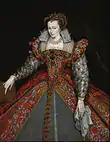
Louise of Lorraine
- January 20 – Bernardino de Cárdenas y Portugal, Duque de Maqueda, Spanish noble (d. 1601)
- January 22 – Mōri Terumoto, Japanese warrior (d. 1625)
- February 24 – Cherubino Alberti, Italian engraver and painter (d. 1615)
- March – Eleonora di Garzia di Toledo, Italian noble (d. 1576)
- March 29 – Vitsentzos Kornaros, Greek writer (d. 1613)
- April 24 – John Maxwell, 8th Lord Maxwell, Scottish noble (d. 1593)
- April 29 – Mirza Muhammad Hakim, son of Mughal emperor Humayun and brother of emperor Akbar (d. 1585)
- April 30 – Louise of Lorraine, French queen consort (d. 1601)
- May 7 – Albert Frederick, Duke of Prussia (d. 1618)
- May 14 – Margaret of Valois, Queen of France (d. 1615)[61]
- June 5 – Bernardino Baldi, Italian mathematician and writer (d. 1617)
- June 15 – Archduke Ernest of Austria, Austrian prince, the son of Maximilian II. (d. 1595)
- July 1 – Peter Street, English carpenter (d. 1609)
- September 26 – Nicolò Contarini, Doge of Venice (d. 1631)
- October 8 – Jacques Auguste de Thou, French historian (d. 1617)
- October 18 – Luca Marenzio, Italian composer (d. 1599)
- November 2 – Magdalene of Jülich-Cleves-Berg, Countess Palatine of Pfalz-Zweibrücken (d. 1633)
- November 4 – Roger Wilbraham, Solicitor-General for Ireland (d. 1616)
- November 23 – Prospero Alpini, Italian physician and botanist (d. 1617)
- November 28 – George More, English politician (d. 1632)
- December 13 – King Henry IV of France (d. 1610)[62]
- date unknown
- Patriarch Filaret of Moscow and All Rus' (d. 1633)
- Giovanni Florio, English writer and translator (d. 1625)
- Richard Hakluyt, English travel writer (d. 1616)
- Robert Hues, English mathematician and geographer (d. 1632)
- Amago Katsuhisa, Japanese nobleman (d. 1578)
- Pierre de Rostegny, French jurist (d. 1631)
- William Russell, 1st Baron Russell of Thornhaugh, English military leader (d. 1613)
- Moses Székely, Hungarian noble (d. 1603)
- Beatrice Michiel, Venetian spy (d. 1613)
1554
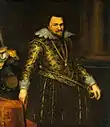
Philip William, Prince of Orange
- January 1 – Louis III, Duke of Württemberg (d. 1593)
- January 9 – Pope Gregory XV (d. 1623)[63]
- January 20 – King Sebastian of Portugal (d. 1578)[64]
- February 8 – Marina de Escobar, Spanish nun (d. 1633)
- February 27 – Giovanni Battista Paggi, Italian painter (d. 1627)
- March – Richard Hooker, Anglican theologian (d. 1600)
- March 1 – William Stafford, English courtier and conspirator (d. 1612)
- March 18 – Josias I, Count of Waldeck-Eisenberg, Count of Waldeck-Eisenberg (1578-1588) (d. 1588)
- March 22 – Catherine de Parthenay, French noblewoman and mathematician (d. 1631)
- March 26 – Charles of Lorraine, Duke of Mayenne, French military leader (d. 1611)
- March 28 – Tsarevich Ivan Ivanovich of Russia (d. 1581)
- March 30 – Paul Laurentius, German divine (d. 1624)
- April – Stephen Gosson, English satirist (d. 1624)
- April 15 – Simon VI, Count of Lippe, Count of Lippe-Detmold (1563-1613) (d. 1613)
- May 20 – Paolo Bellasio, Italian composer (d. 1594)
- June 3 – Pietro de' Medici, Italian noble (d. 1604)
- June 5 – Benedetto Giustiniani, Italian Catholic cardinal (d. 1621)
- June 21 – Joachim of Zollern, Titular Count of Hohenzollern (d. 1587)
- July 5 – Elisabeth of Austria, Queen of France (d. 1592)
- October 1 – Leonardus Lessius, Jesuit theologian (d. 1623)
- October 3 – Fulke Greville, 1st Baron Brooke, English poet (d. 1628)
- October 10 – Arnold III, Count of Bentheim-Steinfurt-Tecklenburg-Limburg and Lord of Rheda (d. 1606)
- October 20 – Bálint Balassi, Hungarian writer and noble (d. 1594)
- October 28 – Enevold Kruse, Danish noble (d. 1621)
- October 30 – Prospero Farinacci, Italian jurist (d. 1618)
- November 30 – Sir Philip Sidney, English courtier and poet (d. 1586)[65]
- December 17 – Ernest of Bavaria, Roman Catholic bishop (d. 1612)
- December 19 – Philip William, Prince of Orange (d. 1618)
- date unknown
- Jacques Bongars, French scholar and diplomat (d. 1612)
- James Lancaster, English navigator (d. 1618)
- Walter Raleigh, English writer, poet, and explorer (d. 1618)
- Francis Throckmorton, English conspirator (d. 1584)
1555
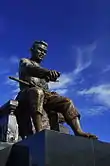
King Naresuan
- January 26 – Charles II, Lord of Monaco (d. 1589)
- February 25 – Alonso Lobo, Spanish musician (d. 1617)
- March 18 – François, Duke of Anjou, youngest son of Henry II of France and Catherine de' Medici (d. 1584)[66]
- March 21 – John Leveson, English politician (d. 1615)
- March 31 – Elizabeth Stuart, Countess of Lennox, English countess (d. 1582)
- April 21 – Ludovico Carracci, Italian painter (d. 1619)
- April 28 – Karl Friedrich of Jülich-Cleves-Berg, heir apparent of Jülich-Cleves-Berg (d. 1575)
- May 5 – Queen Uiin, Korean royal consort (d. 1600)
- May 9 – Jerónima de la Asunción, founder of the first Catholic monastery in Manila, the Monastery of Santa Clara (d. 1630)
- May 29 – George Carew, 1st Earl of Totnes, English earl, general and administrator (d. 1629)
- June 11 – Lodovico Zacconi, Italian composer and music theorist (d. 1627)
- June 13 – Giovanni Antonio Magini, Italian mathematician, cartographer and astronomer (d. 1617)
- June 16 – Duke Otto Henry of Brunswick-Harburg, Hereditary Prince of Brunswick-Lüneburg-Harburg (d. 1591)
- July – Henry Garnet, English Jesuit (d. 1606)
- July 6 – Louis II, Cardinal of Guise, French Catholic cardinal (d. 1588)
- July 17 – Richard Carew, English scholar (d. 1620)
- August 1 – Edward Kelley, English spirit medium (d. 1597)
- September 3 – Jan Zbigniew Ossoliński, Polish nobleman (d. 1628)
- September 21 – John Thynne, English landowner and politician (d. 1604)
- September 23 – Louise de Coligny, princess consort of Orange (d. 1620)
- September 28 – Henri de La Tour d'Auvergne, vicomte de Turenne, duc de Bouillon, Marshal of France (d. 1623)
- October 6 – Ferenc Nádasdy, Hungarian noble (d. 1604)
- October 12 – Peregrine Bertie, 13th Baron Willoughby de Eresby, English baron (d. 1601)
- November 8 – Nyaungyan Min, king of Burma (d. 1605)
- December 4 – Heinrich Meibom, German historian and poet (d. 1625)
- December 27 – Johann Arndt, German Lutheran theologian (d. 1621)
- date unknown
- Lancelot Andrewes, English clergyman and scholar (d. 1626)
- Adam Sędziwój Czarnkowski, Polish nobleman (d. 1628)
- Samuel Eidels, Polish Jewish rabbi and Talmudist (d. 1631)
- Joshua Falk, Polish Jewish rabbi and commentator (d. 1614)
- Elijah Loans, German Jewish rabbi and kabbalist (d. 1636)
- François de Malherbe, French poet (d. 1628)
- Okudaira Sadamasa, Japanese nobleman (d. 1615)
- Konishi Yukinaga, Japanese Christian daimyō (d. 1600)
- Moderata Fonte, Italian poet, writer and philosopher (d. 1592)
- Maria van Schooten, Dutch war heroine (d. 1573)
- Naresuan, King of Ayutthaya (d. 1605)
1556
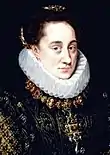
Countess Maria of Nassau
- January 8 – Uesugi Kagekatsu, Japanese samurai and warlord (d. 1623)
- January 24 – Christian Barnekow, Danish noble, explorer and diplomat (d. 1612)
- February 4 – Dorothea of Hanau-Münzenberg, German noblewoman (d. 1638)
- February 7 – Countess Maria of Nassau (d. 1616)
- February 16 – Tōdō Takatora, Japanese daimyō (d. 1630)
- February 21 – Sethus Calvisius, German calendar reformer (d. 1615)
- March 7 – Guillaume du Vair, French statesman and philosopher (d. 1621)[67]
- March 13 – Dirck van Os, Dutch merchant (d. 1615)
- April 8 – David Hoeschel, German librarian (d. 1617)
- April 9 – Andreas von Auersperg, Carniolan noble and military commander in the battle of Sisak (d. 1593)
- April 27 – François Béroalde de Verville, French writer (d. 1626)
- May 31 – Jerzy Radziwiłł, Polish Catholic cardinal (d. 1600)
- June 6 – Edward la Zouche, 11th Baron Zouche, English politician and diplomat (d. 1625)
- June 13 – Pomponio Nenna, Italian composer (d. 1608)
- June 24
- Victoria of Valois, French princess (d. 1556)
- Joan of Valois, French princess (d. 1556)
- July 9 – Elizabeth Finch, 1st Countess of Winchilsea, English countess (d. 1634)
- July 22 – Otto Henry, Count Palatine of Sulzbach (d. 1604)
- July 26 – James Melville, Scottish divine and reformer (d. 1614)
- August 10 – Philipp Nicolai, German Lutheran pastor (d. 1608)
- August 16 – Bartolomeo Cesi, Italian painter (d. 1629)
- August 17 – Alexander Briant, English Jesuit martyr (d. 1581)
- September 21 – William Harris, English knight (d. 1616)
- October 18
- October 24 – Giovanni Battista Caccini, Italian artist (d. 1613)
- October 26 – Ahmad Baba al Massufi, Malian academic (d. 1627)
- November 15 – Jacques Davy Duperron, French cardinal (d. 1618)
- November 28 – Francesco Contarini, Doge of Venice (d. 1624)
- December 5 – Anne Cecil, Countess of Oxford, English countess (d. 1588)
- December 17 – Abdul Rahim Khan-I-Khana, Indian composer (d. 1627)
- December 27 – Jeanne de Lestonnac, French saint (d. 1640)
- date unknown
1557
- January 1 – Stephen Bocskay, Prince of Transylvania (d. 1606)
- February 11 – Johannes Wtenbogaert, Leader of the Remonstrants (d. 1644)
- February 15
- February 24 – Mathias, Holy Roman Emperor (d. 1619)
- March 21 – Anne Howard, Countess of Arundel, English countess and poet (d. 1630)
- March 22 – Casimir VI, Duke of Pomerania and Lutheran Administrator of Cammin Prince-Bishopric (d. 1605)
- April 4 – Lew Sapieha, Polish-Lithuanian noble (d. 1633)
- April 11 – Frederick, Count Palatine of Zweibrücken-Vohenstrauss-Parkstein (d. 1597)
- May 5 – Emanuel Philibert de Lalaing, Belgian noble and army commander (d. 1590)
- May 31 – Tsar Feodor I of Russia (d. 1598)
- June 10 – Leandro Bassano, Italian painter (d. 1622)
- June 28 – Philip Howard, 20th Earl of Arundel, English nobleman (d. 1595)
- August 16 – Agostino Carracci, Italian painter and graphical artist (d. 1602)
- August 19 – Frederick I, Duke of Württemberg (d. 1608)
- August 26 – Sibylle of Jülich-Cleves-Berg, Duchess of Jülich-Cleves-Berg by birth and by marriage Margravine of Burgau (d. 1628)
- September 4 – Sophie of Mecklenburg-Güstrow, Danish-Norwegian royal consort (d. 1631)
- September 11 – Joseph Calasanz, Spanish priest and founder of Piarists (d. 1648)
- September 16 – Jacques Mauduit, French composer (d. 1627)
- October 5 – Antoine Favre, Savoisian lawyer, first President of the Sovereign Senate of Savoy (d. 1624)
- date unknown
- Julius Caesar, English judge and politician (d. 1636)
- Giovanni Croce, Italian composer (d. 1609)
- Balthasar Gérard, assassin of William I of Orange (d. 1584)
- Toda Katsushige, Japanese warlord (d. 1600)
- Olaus Martini, Archbishop of Uppsala (d. 1609)
- Thomas Morley, English composer (d. 1602)
- Oda Nobutada, Japanese general (d. 1582)
- probable – Giovanni Gabrieli, Italian composer and organist (d. 1612)
1558
.jpg.webp)
André du Laurens

Maximilian III, Archduke of Austria
- January or February – Hendrik Goltzius, Dutch painter (d. 1617)
- January 16 – Jakobea of Baden, Margravine of Baden by birth, Duchess of Jülich-Cleves-Berg by marriage (d. 1597)
- January 29 – Paul Hentzner, German lawyer (d. 1623)
- March 7 – Johann VII, Duke of Mecklenburg, Duke of Mecklenburg-Schwerin (1576–1592) (d. 1592)
- April 30 – Mikołaj Oleśnicki the younger, Polish noble (d. 1629)
- June 15 – Margrave Andrew of Burgau, German nobleman, Cardinal, Bishop of Constance and Brixen (d. 1600)
- July 9 – David Origanus, German astronomer (d. 1628)
- July 11 – Robert Greene, English dramatist (d. 1592)
- August 2 – Herman van den Bergh, Dutch soldier in the Eighty Years' War (d. 1611)
- August 8 – George Clifford, 3rd Earl of Cumberland, English noble (d. 1605)
- August 19 – François de Bourbon, Prince of Conti (d. 1614)
- September 9 – Philippe Emmanuel, Duke of Mercœur, French soldier (d. 1602)
- September 24 – Ralph Eure, 3rd Baron Eure, English politician (d. 1617)
- October 12 – Maximilian III, Archduke of Austria (d. 1618)
- October 24 – Szymon Szymonowic, Polish writer (d. 1629)
- October 30 – Jacques-Nompar de Caumont, duc de La Force, Marshal of France (d. 1652)
- November 27 – Mingyi Swa, Crown Prince of Burma (d. 1593)
- December 3 – Gregorio Pagani, Italian painter (d. 1605)
- December 8 – François de La Rochefoucauld, French Catholic cardinal (d. 1645)
- December 9 – André du Laurens, French physician (d. 1609)
- date unknown
- Meir Lublin, Polish rabbi (d. 1616)
- Kōriki Masanaga, Japanese military commander (d. 1599)
- Bessho Nagaharu, Japanese nobleman (d. 1580)
- Olivier van Noort, first Dutchman to circumnavigate the world (d. 1627)
- Chidiock Tichborne, English conspirator and poet (d. 1586)
- Michael the Brave, Prince of Wallachia (1593–1601) (d. 1601)
- Thomas Kyd, English playwright (d. 1594)
- Françoise de Cezelli, French war hero (d. 1615)
- probable - Pierre Dugua, Sieur de Mons, French merchant (d. 1628)
1559
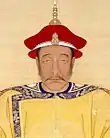
Emperor Nurhaci born on February 19
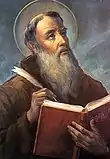
Lawrence of Brindisi born on July 22
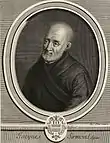
Jacques Sirmond born on October 12
- January 1 – Virginia Eriksdotter, Swedish noble (d. 1633)
- January 8 – William Helyar, English chaplain (d. 1645)
- January 25 – Aleixo de Menezes, Roman Catholic archbishop (d. 1617)
- February 7 – Catherine de Bourbon, Princess of Navarre and Duchess consort of Lorraine (d. 1604)
- February 18 – Isaac Casaubon, French-born classical scholar (d. 1614)
- February 19 – Philip II, Margrave of Baden-Baden (d. 1588)
- February 21 – Nurhaci, Chinese emperor (d. 1626)
- March 12 – Christoph Brouwer, Dutch historian (d. 1617)
- March 16 – Amar Singh I, eldest son and successor of Maharana Pratap of Mewar (d. 1620)
- March 26 – Wolf Dietrich Raitenau, Prince-Bishop of Salzburg (d. 1617)
- May 4 – Alice Spencer, Countess of Derby, Baroness Ellesmere and Viscountess Brackley (d. 1637)
- May 12
- July 2 – Margareta Brahe, Swedish political activist (d. 1638)
- July 22 – Lawrence of Brindisi, Italian saint (d. 1619)
- July 27 – Countess Palatine Barbara of Zweibrücken-Neuburg and Countess consort of Oettingen-Oettingen (d. 1618)
- August 18 – Frederik van den Bergh, Dutch soldier in the Eighty Years' War (d. 1618)
- August 24 or September 1556 – Sophia Brahe, Danish astronomer, horticulturalist (d. 1643)
- September 21 – Cigoli, Italian painter (d. 1613)
- September 15 – Edmond Richer, French theologian (d. 1631)
- October 12 or October 22 – Jacques Sirmond, French Jesuit scholar (d. 1651)
- November 11 – Tokuhime, Japanese noble (d. 1636)
- November 12 – Yaza Datu Kalaya, Crown Princess of Burma (d. 1603)
- November 13 – Al-Mansur al-Qasim, Imam of Yemen (d. 1620)
- November 15 – Albert VII, Archduke of Austria, Governor of the Low Countries (d. 1621)
- December 14 – Lupercio Leonardo de Argensola, Spanish writer (d. 1613)
- date unknown
Deaths
1550
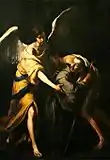
Saint John of God
- January 12 – Andrea Alciato, Italian jurist and writer (b. 1492)
- January 22 – Jamsheed Quli Qutb Shah, second ruler of Golconda
- January 28 – Magnus III of Mecklenburg-Schwerin, Lutheran administrator of the Prince-Bishopric of Schwerin (b. 1509)
- February 22 – Francesco III Gonzaga, Duke of Mantua (b. 1533)
- March 7 – William IV, Duke of Bavaria (b. 1493)
- March 8 – John of God, Spanish friar and saint (b. 1495)
- April 12 – Claude, Duke of Guise, French soldier (b. 1496)[69]
- April 13 – Innocenzo Cybo, Italian Catholic cardinal (b. 1491)
- April 30 – King Tabinshwehti of Burma (b. 1516)
- May 18 – Jean, Cardinal of Lorraine, French churchman (b. 1498)
- May 20 – Ashikaga Yoshiharu, Japanese shōgun (b. 1511)
- June 13 – Veronica Gambara, Italian poet (b. 1485)
- July 19 (probable date) – Jacopo Bonfadio, Italian historian, executed (b. c. 1508)
- July 22 – Jorge de Lencastre, Duke of Coimbra (b. 1481)
- July 30 – Thomas Wriothesley, 1st Earl of Southampton, English politician (b. 1505)
- August 18 – Antonio Ferramolino, Italian architect and military engineer
- October 20 – Ferdinand, Duke of Calabria (b. 1488)
- October 23 – Tiedemann Giese, Polish Catholic bishop (b. 1480)
- October 24 – Louis of Valois, French prince (b. 1549)
- October 26 – Samuel Maciejowski, Polish Catholic bishop (b. 1499)
- November 6 – Ulrich, Duke of Württemberg (b. 1487)
- November 7 – Jón Arason, last Catholic bishop of Iceland (b. 1484)
- December 6 – Pieter Coecke van Aelst, Flemish painter (b. 1502)
- December 8 – Gian Giorgio Trissino, Italian humanist, poet, dramatist and diplomat (b. 1478)
- December 29 – Bhuvanaikabahu VII, King of Kotte (b. 1468)
- date unknown – Aq Kubek of Astrakhan, ruler of Astrakhan Khanate
1551

Barbara Radziwiłł
- February 4 – John V, Prince of Anhalt-Zerbst, Prince of Anahlt-Dessau (1516–1544) and Anhalt-Zerbst (1544–1551) (b. 1504)
- February 28 – Martin Bucer, German Protestant reformer (b. 1491)[70]
- April 6 – Joachim Vadian, Swiss humanist (b. 1484)
- April 8 – Oda Nobuhide, Japanese warlord (b. 1510)
- May 8 – Barbara Radziwiłł, queen of Sigismund II of Poland (b. 1523)
- May 17 – Shin Saimdang, Korean artist, calligrapher and writer (b. 1504)
- May 18 – Domenico di Pace Beccafumi, Italian painter (b. 1486)
- June 24 – Charles II de Croÿ, Belgian duke (b. 1522)
- July – Adriaen Isenbrandt, Flemish painter (b. 1490)
- July 13 – John Wallop, English soldier and diplomat (b. 1490)
- July 14 – Henry Brandon, 2nd Duke of Suffolk (b. 1535)
- August 8 – Fray Tomás de Berlanga, Bishop of Panama (b. 1487)
- August 12 – Paul Speratus, German Lutheran (b. 1484)
- August 26 – Margaret Leijonhufvud, queen of Gustav I of Sweden (b. 1516)
- September 30 – Ōuchi Yoshitaka, Japanese warlord (b. 1507)
- November 20 – Hindal Mirza, Mughal Empire emperor (b. 1519)
- date unknown
1552
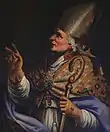
Henry of the Palatinate
.jpg.webp)
Henry V, Duke of Mecklenburg
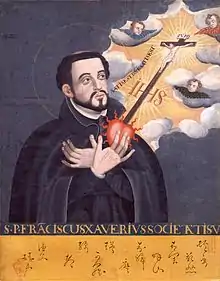
Saint Francis Xavier
- January 3 – Henry of the Palatinate, bishop of Utrecht (b. 1487)
- January 10 – Johann Cochlaeus, German humanist and controversialist (b. 1479)
- January 22 – Edward Seymour, 1st Duke of Somerset, English politician (b. 1509)
- February 6 – Henry V, Duke of Mecklenburg (b. 1479)
- February 20 – Anne Parr, Countess of Pembroke, English countess (b. 1515)
- February 26 – Heinrich Faber, German composer (b. 1500)
- March 29 – Guru Angad, Indian religious leader (b. 1504)
- April 19 – Olaus Petri, Swedish clergyman (b. 1493)
- April 18 – John Leland, English historian (b. 1502)[72]
- April 21 – Petrus Apianus, German astronomer (b. 1495)
- May 26 – Sebastian Münster, German cartographer and cosmographer (b. 1488)
- June 10 – Alexander Barclay, British poet (b. 1476)
- July 9 – György Szondy, Hungarian soldier
- August 15 – Hermann of Wied, German Catholic archbishop (b. 1477)
- September 23 – Barbara of Brandenburg-Ansbach-Kulmbach, Landgravine of Leuchtenberg (b. 1495)
- October 14 – Oswald Myconius, Swiss Protestant reformer (b. 1488)
- October 17 – Andreas Osiander, German Protestant theologian (b. 1498)
- November 10 – Günther XL, Count of Schwarzburg (b. 1499)
- December 3 – Francis Xavier, Spanish Jesuit missionary and saint (b. 1506)[73]
- December 20 – Katharina von Bora, wife of Martin Luther (b. 1499)
1553
- January 13 – George II, Duke of Münsterberg-Oels, Count of Glatz (b. 1512)
- February 4 – Caspar Othmayr, German Protestant priest, theologian and composer (b. 1515)
- February 6 – Ernest, Margrave of Baden-Durlach (b. 1482)
- February 8 – John Ernest, Duke of Saxe-Coburg, (b. 1521)
- February 17 – Chamaraja Wodeyar III, King of Mysore (b. 1492)
- February 19 – Erasmus Reinhold, German astronomer and mathematician (b. 1511)
- February 25 – Hirate Masahide, Japanese diplomat and tutor of Oda Nobunaga (suicide) (b. 1492)
- April – Minkhaung of Prome, last king of Prome in Burma (Myanmar).
- April 9 – François Rabelais, French writer[74]
- May 5 – Erasmus Alberus, German humanist (b. 1500)
- May 28 – Johannes Aal, Swiss theologian (b. 1500)
- June 26 – Tsarevich Dmitry Ivanovich of Russia, Grand Prince of Moscow (b. 1552)
- July 6 – King Edward VI of England (b. 1537)[75]
- July 9 – Maurice, Elector of Saxony (b. 1521)[15]
- July 16 – Bernardino Maffei, Catholic cardinal (b. 1514)
- August 6 – Girolamo Fracastoro, Italian physician (b. 1478)
- August 17 – Charles III, Duke of Savoy (b. 1486)
- August 22 – John Dudley, 1st Duke of Northumberland (b. 1502; executed)
- September 6 – Juan de Homedes y Coscon, 47th Grandmaster of the Knights Hospitaller (b. c.1477)
- October 6 – Şehzade Mustafa, Suleiman the Magnificent's first-born son by Mahidevran Sultan (b. 1515)
- October 7 – Cristóbal de Morales, Spanish composer (b. 1500)[76]
- October 16 – Lucas Cranach the Elder, German painter (b. 1472)
- October 17 – George III, Prince of Anhalt-Dessau, German prince (b. 1507)
- October 27 – Michael Servetus, Spanish Protestant theologian (burned at the stake) (b. 1511)
- October 28 – Giovanni Salviati, Italian Catholic cardinal (b. 1490)
- October 30 – Jacob Sturm von Sturmeck, German statesman and reformer (b. 1489)
- November 15 – Lucrezia de' Medici, Italian noblewoman (b. 1470)
- November 23 – Sebastiano Antonio Pighini, Italian cardinal (b. 1500)
- November 27 – Şehzade Cihangir, Ottoman prince (b. 1531)
- December 3 – Ludwig of Hanau-Lichtenberg, German nobleman (b. 1487)
- December 25 – Pedro de Valdivia, Spanish conquistador (b. 1497)
- date unknown
- George Joye, English Protestant Bible translator (b. c. 1495)
- Gunilla Bese, Finnish noble and fiefholder (b. 1475)
1554

Francisco Vázquez de Coronado
- January 2 – João Manuel, Prince of Portugal, Portuguese prince (b. 1537)[77]
- January 11 – Min Bin, king of Arakan (b. 1493)
- January 16
- February 12
- Lord Guildford Dudley, consort of Lady Jane Grey (executed) (b. 1536)[78]
- Lady Jane Grey, claimant to the throne of England (executed) (b. 1537)[79]
- February 21
- February 23 – Henry Grey, 1st Duke of Suffolk, English politician (executed) (b. c.1515)
- March 3 – John Frederick I, Elector of Saxony (b. 1503)
- April 11 – Thomas Wyatt the Younger, English rebel (executed) (b. 1521)
- April 23 – Gaspara Stampa, Italian poet (b. 1523)
- May 2 – William Waldegrave, English Member of Parliament (b. 1507)
- June 19
- June 28 – Leone Strozzi, French Navy admiral (b. 1515)
- August 25 – Thomas Howard, 3rd Duke of Norfolk, English politician (b. 1473)
- September 22 – Francisco Vázquez de Coronado, Spanish conquistador (b. c. 1510)
- December 22 – Alessandro Bonvicino, Italian painter (b. 1498)
- December – John Taylor, Bishop of Lincoln (b. 1503)
- approx. date – Susannah Hornebolt, English artist (b. 1503)
- date unknown
1555
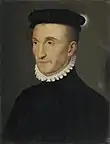
King Henry II of Navarre

Saint Thomas of Villanova
- January 14 – Jacques Dubois, French anatomist (b. 1478)
- February 4 – John Rogers, English clergyman (burned at the stake) (b. c. 1505)
- February 8 – Laurence Saunders, English clergyman (burned at the stake) (b. 1519)
- February 9
- February 17 – Giuliano Bugiardini, Italian painter (b. 1475)
- March 14 – John Russell, 1st Earl of Bedford (b. 1485)
- March 23 – Pope Julius III (b. 1487)[80]
- March 27 – Al-Mutawakkil Yahya Sharaf ad-Din, Imam of the Zaidi state in Yemen (b. 1473)
- April 12 – Queen Joanna of Castile, long under confinement (b. 1479)
- April 18 – Polydore Vergil, English historian (b. 1470)[81]
- May 1 – Pope Marcellus II (b. 1501)
- May 21 – George III, Landgrave of Leuchtenberg (b. 1502)
- May 25
- June 10 – Elizabeth of Denmark, Electress of Brandenburg (1502–1535) (b. 1485)
- September 8 – Thomas of Villanova, Spanish Roman Catholic bishop and saint (b. 1488)
- October 5 – Edward Wotton, English zoologist (b. 1492)
- October 9 – Justus Jonas, German Protestant reformer (b. 1493)
- October 16
- October 26 – Olympia Fulvia Morata, Italian classical scholar (b. 1526)
- November 4 – Agnes of Hesse, German nobleman, by marriage, Princess of Saxony (b. 1527)
- November 12
- November 21 – Georgius Agricola, German scientist (b. 1490)
- December – Stanisław Kostka, Polish noble (b. 1487)
- December 9 – Elisabeth of Culemborg, German noble (b. 1475)
1556
_Founder_of_the_Jesuits.jpg.webp)
Saint Ignatius of Loyola
- January 8 – Anne Shelton, English courtier, elder sister of Thomas Boleyn (b. 1475)
- January 27 – Humayun, 2nd Mughal Emperor (b. 1508)
- February 12 – Giovanni Poggio, Italian cardinal and diplomat (b. 1493)
- February 26 – Frederick II, Elector Palatine (1544–1556) (b. 1482)
- March 21 – Thomas Cranmer, Archbishop of Canterbury (burned at the stake) (b. 1489)[82]
- April 18
- April 26 – Valentin Friedland, German scholar and educationist of the Reformation (b. 1490)
- May 4 – Luca Ghini, Italian physician and botanist (b. 1490)
- May 28 – Saitō Dōsan, Japanese warlord (b. 1494)
- June 10 – Martin Agricola, German composer (b. 1486)[83]
- June 24 – Joan of Valois, French princess (b. 1556)
- July 31 – Ignatius of Loyola, Spanish founder of the Jesuit order and saint (b. 1491)
- August 1 – Girolamo da Carpi, Italian painter (b. 1501)
- August 11 – John Bell, Bishop of Worcester
- August 17 – Victoria of Valois, French princess (b. 1556)
- September – Patrick Hepburn, 3rd Earl of Bothwell, Scottish traitor (b. 1512)
- October 7 – Frederick of Denmark, Prince-bishop (b. 1532)
- October 21 – Pietro Aretino, Italian author (b. 1492)
- November 10 – Richard Chancellor, English Arctic explorer (drowned at sea) (b. c. 1521)
- November 14 – Giovanni della Casa, Italian poet (b. 1503)
- date unknown
- probable
- Brian mac Cathaoir O Conchobhair Failghe, last of the Kings of Ui Failghe
- Jacob Clemens non Papa, Flemish composer (b. 1510)
1557

Emperor Go-Nara of Japan
- January 2 – Pontormo, Italian painter (b. 1494)
- January 4 – Philip, Duke of Mecklenburg, (b. 1514)
- January 8 – Albert Alcibiades, Margrave of Brandenburg-Kulmbach ("Albert the Warlike"), Prince of Bayreuth (b. 1522)[84]
- March 13 – Louis de Bourbon de Vendôme, French cardinal (b. 1493)
- April 9 – Mikael Agricola, Finnish scholar (b. c. 1510)
- April 24 – Georg Rörer, German theologian (b. 1492)
- April 29 – Lautaro, Mapuche warrior (b. 1534)
- May 18 – John II, Count Palatine of Simmern, Count Palatine of Simmern (1509-1557) (b. 1492)
- June 11 – King John III of Portugal (b. 1502)
- July 10 – Giovanni Battista Ramusio, Italian geographer (b. 1485)
- July 16 – Anne of Cleves, fourth queen of Henry VIII of England (b. 1515)[85]
- August 1 – Olaus Magnus, Swedish ecclesiastic and writer (b. 1490)
- August 18 – Claude de la Sengle, 48th Grandmaster of the Knights Hospitaller (b. 1494)
- September 1 – Jacques Cartier, French explorer (b. 1491)[86]
- September 13 – John Cheke, English classical scholar and statesman (b. 1514)
- September 15 – Juan Álvarez de Toledo, Spanish Catholic cardinal (b. 1488)
- September 27 – Emperor Go-Nara of Japan (b. 1495)
- October 5 or October 6 – Kamran Mirza, Mughal prince (b. 1509)
- October 20 – Jean Salmon Macrin, French poet (b. 1490)
- October 25 – William Cavendish, English courtier (b. 1505)
- November 19
- Bona Sforza, queen of Sigismund I of Poland (b. 1494)
- Maria de' Medici, Italian noble (b. 1540)
- December 6 – Elisabeth of Hesse, Hereditary Princess of Saxony (b. 1502)
- December 13 – Niccolò Fontana Tartaglia, Italian mathematician (b. 1499)
- December 27 – Queen Dangyeong, Korean royal consort (b. 1487)
- date unknown
- probable
1558

Emperor Charles V

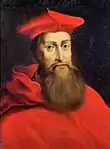
Queen Mary I of England and Cardinal Reginald Pole died on November 17, 1558
- January 28 – Jacob Micyllus, German humanist (b. 1503)
- February 25 – Eleanor of Austria, Queen of Portugal and France (b. 1498)
- February 27
- March 6 – Luca Gaurico, Italian astrologer (b. 1475)
- March 24 – Anna van Egmont, Countess of Egmond and Buren (b. c. 1533)
- March 25 – Marcos de Niza, French Franciscan explorer (b. c. 1495)
- April 2 – Wolfgang of the Palatinate, Count Palatine of Neumarkt (b. 1494)
- April 15 – Hurrem Sultan, Ruthenian-born wife of Suleiman the Magnificent (b. c. 1500)
- April 20 – Johannes Bugenhagen, German reformer (b. 1485)
- April 26 – Jean Fernel, French physician (b. 1497)[88]
- May 17 – Francisco de Sá de Miranda, Portuguese poet (b. 1485)
- May 19 – Juan Téllez-Girón, 4th Count of Ureña, Spanish count (b. 1494)
- May 25 – Elisabeth of Brandenburg, Duchess of Brunswick-Calenberg-Göttingen (1525–1540) (b. 1510)[89]
- May 31 – Philip Hoby, English politician (b. 1505)
- June 28 – Thomas Darcy, 1st Baron Darcy of Chiche, English courtier (b. 1506)
- July 17 – George I of Württemberg-Mömpelgard (b. 1498)
- August 11 – Justus Menius, German Lutheran pastor (b. 1499)[90]
- September 21 – Charles V, Holy Roman Emperor (b. 1500)[91]
- October – Mellin de Saint-Gelais, French poet (b. c. 1491)
- October 18 – Maria of Austria, queen of Louis II of Hungary and Bohemia (b. 1505)
- October 21 – J. C. Scaliger, Italian scholar (b. 1484)[92]
- November 1
- November 15 – Gilbert Kennedy, 3rd Earl of Cassilis, Scottish politician and judge (b. 1515)
- November 17
- (bur.) Hugh Aston, English composer (b. 1485)
- Queen Mary I of England (b. 1516)[93]
- Reginald Pole, Cardinal Archbishop of Canterbury (b. 1500)
- December 7 – Johann Forster, German theologian (b. 1496)
- December 16 – Thomas Cheney, Lord Warden of the Cinque Ports (b. c. 1485)
- December 19 – Cornelius Grapheus, Flemish writer (b. 1482)
- December 28 – Hermann Finck, German composer (b. 1527)
- date unknown
1559

King Christian III of Denmark and Norway died on New Year's Day, January 1, 1559
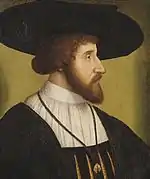
King Christian II of Denmark, Norway and Sweden died on January 25, 1559
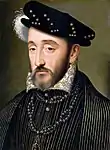
King Henry II of France died on July 10, 1559
%252C_ca._1560.jpg.webp)
Pope Paul IV died on August 18, 1559
- January – Christina Gyllenstierna, leading opponent of King Christian II of Denmark and Norway (b. 1494)
- January 1 – King Christian III of Denmark and Norway (b. 1503)[94]
- January 25 – King Christian II of Denmark, Norway and Sweden (b. 1481)
- February 12 – Prince-elector Otto Henry of the Palatinate (b. 1502)
- March 8 – Thomas Tresham, English Catholic politician
- March 13 – Johann Gropper, German Catholic cardinal (b. 1503)
- March 16 – Anthony St. Leger, Lord Deputy of Ireland (b. 1496)
- March 23 – Emperor Gelawdewos of Ethiopia (in battle) (b. 1522)
- March 30 – Adam Ries, German mathematician (b. 1492)
- June 3 – Elisabeth of Nassau-Siegen, German noblewoman (b. 1488)
- July 10 – King Henry II of France (jousting accident) (b. 1519)[44]
- August 18 – Pope Paul IV (b. 1476)[95]
- September 7 – Robert Estienne, French printer (b. 1503)
- September 15 – Isabella Jagiellon, queen consort of Hungary (d. 1519)
- October 2 – Jacquet of Mantua, French composer (b. 1483)
- October 3 – Ercole II d'Este, Duke of Ferrara, Italian noble (b. 1508)
- October 4 – Philip III, Count of Nassau-Weilburg (b. 1504)
- October 6 – William I, Count of Nassau-Siegen (b. 1487)
- November 5 – Kanō Motonobu, Japanese painter (b. 1476)
- November 10 – Jacob Milich, German astronomer and mathematician (b. 1501)
- November 18 – Cuthbert Tunstall, English church leader (b. 1474)
- November 20 – Frances Grey, Duchess of Suffolk, English noblewoman and claimant to the throne of England (b. 1517)
- November 26 – Adolph of Nassau-Saarbrücken, Count of Nassau (b. 1526)
- December 17 – Irene di Spilimbergo, Italian Renaissance poet and painter (b. 1538)
- December 31 – Owen Oglethorpe, deposed English bishop
- date unknown
- Realdo Colombo, Italian surgeon and anatomist (b. 1516)
- Elizabeth Wilford, English merchant and company founder
- Father Francis of Aberdeen, Catholic Trinitarian friar
- Leonard Digges, English mathematician and surveyor (b. c. 1515)
- Conn O'Neill, 1st Earl of Tyrone, Irish rebel (b. 1480)
- Wen Zhengming, Chinese painter (b. 1470)
References
- Williams, Hywel (2005). Cassell's Chronology of World History. London: Weidenfeld & Nicolson. pp. 218–223. ISBN 0-304-35730-8.
- Broecke, Steven Vanden (2003). The Limits of Influence: Pico, Louvain, and the Crisis of Renaissance Astrology. Leiden: Brill. p. 168. ISBN 9789004131699.
- "Alster-Beste Kanal (Alster-Trave-Kanal.)". Lost Canals of Schleswig-Holstein. 2007-05-29. Retrieved 2020-02-21.
- Joze Krasovec (1 October 1999). The Interpretation of the Bible: The International Symposium in Slovenia. A&C Black. p. 1078. ISBN 978-0-567-34563-9.
- Steven Runciman. The Great Church in Captivity. Cambridge University Press, 1985. Page 329.
- Trenkle, Franz Sales (3 March 2003). "Council of Trent". Retrieved 24 May 2018.
- Badger, George Percy (1838). Description of Malta and Gozo. Malta: M. Weiss. p. 292.
- David Loades (1996): John Dudley, Duke of Northumberland 1504–1553. Clarendon Press. ISBN 0-19-820193-1. pp. 180–181
- Robert Balmain Mowat (1971). A History of European Diplomacy, 1451–1789. Archon Books. p. 54. ISBN 978-0-208-01021-6.
- Fierro, Maribel, ed. (2010). "Chronology". The New Cambridge History of Islam, Volume 2: The Western Islamic World, Eleventh to Eighteenth Centuries. Cambridge: Cambridge University Press. p. xxxiii. ISBN 978-0-521-83957-0.
Failed Ottoman attempt to conquer Hormuz.
- Grun, Bernard (1991). the Timetables of History (3rd ed.). New York: Simon & Schuster. p. 245. ISBN 0-671-74919-6.
- "History of the School". Christ's Hospital. Retrieved 26 March 2017.
- https://privycouncil.independent.gov.uk/royal-charters/chartered-bodies/ Archived June 21, 2019, at the Wayback Machine retrieved 24 Mar 2017
- "St Thomas's Hospital – A Concise History". gkt gazette. Guy's, King's & St. Thomas's Hospitals Medical & Dental Schools. 1 February 2002. Archived from the original on 25 October 2006.
- Thomas M. Lindsay (8 October 1999). A History of the Reformation, 2 Volumes. Wipf and Stock Publishers. p. 506. ISBN 978-1-57910-283-8.
- Derrik Mercer (February 1993). Chronicle of the Royal Family. Chronicle Communications. pp. 160–166. ISBN 978-1-872031-20-0.
- Nicola Tallis (6 December 2016). Crown of Blood: The Deadly Inheritance of Lady Jane Grey. Pegasus Books. pp. 10–. ISBN 978-1-68177-287-5.
- Eric Ives (2009): Lady Jane Grey: A Tudor Mystery Wiley-Blackwell. ISBN 978-1-4051-9413-6. Pages 96-7.
- A General History of the Middle East, Chapter 13: Ottoman Era, Suleiman the Magnificent, xenohistorian.faithweb.com; accessed January 8, 2015.
- Barros Arana, Diego. "Capítulo XIV". Historia general de Chile (in Spanish). Vol. Tomo cuarto (Digital edition based on the second edition of 2000 ed.). Alicante: Biblioteca Virtual Miguel de Cervantes. pp. 346–347.
- University of Gauhati (1952). Journal of the University of Gauhati. The University. p. 237.
- Palmer, Alan; Veronica (1992). The Chronology of British History. London: Century Ltd. pp. 150–153. ISBN 0-7126-5616-2.
- Samson, Alexander (2005). "Changing Places: The Marriage and Royal Entry of Philip, Prince of Austria, and Mary Tudor, July-August 1554". The Sixteenth Century Journal. 36 (3): 761–784. doi:10.2307/20477489. JSTOR 20477489.
- Grun, Bernard (1991). The Timetables of History (3rd ed.). New York: Simon & Schuster. p. 245. ISBN 0-671-74919-6.
- Kerr, Robert (1824). A general history and collection of voyages and travels. Vol. 7. Edinburgh: Blackwood. p. 229. Retrieved 2011-11-27.
- Maureen E. Buja (1996). Antonio Barré and Music Printing in Mid-sixteenth Century Rome. University of North Carolina at Chapel Hill. p. 81.
- Paul Johnson (1997). The Papacy. Barnes & Noble Books. p. 216. ISBN 978-0-7607-0755-5.
- Ronald Love (14 March 2001). Blood and Religion: The Conscience of Henri IV. McGill-Queen's Press - MQUP. pp. 25–. ISBN 978-0-7735-6884-6.
- "Significant Earthquake Information INDIA: KASHMIR: SRINAGAR". ngdc.noaa.gov. NCEI. Retrieved 7 August 2021.
- E. Goldsmid (ed.), The Principal Navigations, Voyages, Traffiques and Discoveries of the English Nation, collected by Richard Hakluyt, Preacher, Vol. III: North-Eastern Europe and Adjacent Countries, Part II: The Muscovy Company and the North-Eastern Passage (E. & G. Goldsmid, Edinburgh 1886), pp. 101-112.
- Hadfield, Andrew (2004). "Eden, Richard (c.1520–1576)". Oxford Dictionary of National Biography (online ed.). Oxford University Press. doi:10.1093/ref:odnb/8454. Retrieved 2011-12-12. (Subscription or UK public library membership required.)
- Ireland. Dept. of Foreign Affairs (1987). Ireland today. Information Section, Dept. of Foreign Affairs. Retrieved 9 June 2012.
- Allied Powers (1919- ). Reparation Commission (1921). Belgian Claims to the Triptych of Saint Ildephonse and the Treasure of the Order of the Golden Fleece. p. 35.
- "Kings Of Poland 1386-1572". Medieval Lands. Retrieved 2012-01-03.
- Archer, Christon; et al. (2002). World History of Warfare. Lincoln: University of Nebraska Press. p. 251. ISBN 978-0-8032-4423-8.
- "History – Gonville & Caius". Gonville & Caius College. October 15, 2012. Retrieved 13 September 2014.
- H. S. Bennett (1989). English Books and Readers 1475 to 1557: Being a Study in the History of the Book Trade from Caxton to the Incorporation of the Stationers' Company. Cambridge University Press. p. 114. ISBN 978-0-521-37988-5.
- J. W. Ruuth (1958). "Kaupungin perustamiskirje". Porin kaupungin historia II (in Finnish). City of Pori. p. 269.
- Lillian S. Robinson (1985). Monstrous Regiment: The Lady Knight in Sixteenth-century Epic. Garland Pub. p. 112. ISBN 978-0-8240-6709-0.
- Grun, Bernard (1991). The Timetables of History (3rd ed.). New York: Simon & Schuster. p. 247. ISBN 0-671-74919-6.
- Sykes, Percy (1921). A History of Persia. London: Macmillan and Company. p. 64.
- Geoffrey Abbott (2001). Crowning Disasters. Capall Bann Publishing. p. 56. ISBN 978-1-86163-132-9.
- Jean d' Aubusson de la Maison Neuve; Victor Ernest Graham; Victor E. Graham (1979). Recueil Et Discours Du Voyage Du Roy Charles IX. University of Toronto Press. p. 457. ISBN 978-0-8020-5406-7.
- "Henry II | king of France". Encyclopedia Britannica. Retrieved 10 April 2019.
- "Francis II | king of France". Encyclopedia Britannica. Retrieved 10 April 2019.
- Escallier, Énée Aimé (1852). L'abbaye d'Anchin, 1079-1792 (in French). L. Lefort.
- Guy, John, My Heart is my Own, London, Fourth Estate, 2004, ISBN 1841157538
- G.R. Elton, ed. The New Cambridge Modern History, Vol. 2: The Reformation, 1520–1559 (1st ed. 1958); Lewis Spitz, The Protestant Reformation: 1517–1559 (2003).
- Mark Pattison (1875). Isaac Casaubon, 1559-1614. Longmans, Green. p. 11.
- John Calvin : for a new reformation. Derek Thomas. Wheaton, Illinois. 2019. ISBN 978-1-4335-1281-0. OCLC 1091236732.
{{cite book}}: CS1 maint: others (link) - Austin, Gregory. "Chronology of Psychoactive Substance Use". Drugs & Society. Comitas Institute for Anthropological Study. Archived from the original on October 12, 2011. Retrieved 2011-10-07.
- Alexandre Dumas (1999). La Reine Margot. Oxford University Press. p. 510. ISBN 978-0-19-283844-5.
- Charles George Herbermann; Edward Aloysius Pace; Condé Bénoist Pallen (1913). The Catholic Encyclopedia: An International Work of Reference on the Constitution, Doctrine, Discipline, and History of the Catholic Church. Encyclopedia Press. p. 581.
- Grolier Incorporated (1993). Academic American encyclopedia. Grolier. p. 297. ISBN 978-0-7172-2047-2.
- Charles W. J. Withers; Hayden Lorimer (27 October 2011). Geographers Volume 27: Biobibliographical Studies. A&C Black. p. 28. ISBN 978-1-4411-8011-7.
- Jayne Maloof Williamson (1968). The War of the Three Henries: Why?: The Motives Prompting Henri de Navarre, Henry de Guise, and Henri III to Engage in War, 1585-1589. University of Wisconsin--Madison. p. 96.
- Nicholls, Mark; Williams, Penry (17 September 2004). "Ralegh, Sir Walter (1554–1618)". Oxford Dictionary of National Biography (online ed.). Oxford University Press. doi:10.1093/ref:odnb/23039. (Subscription or UK public library membership required.)
- St James Press; Anthony Levi; Retired Professor of French Anthony Levi (1992). Guide to French Literature: Beginnings to 1789. St. James Press. p. 6. ISBN 978-1-55862-159-6.
- "Rudolf II | Holy Roman emperor". Encyclopedia Britannica. Retrieved 13 April 2020.
- Campbell, Gordon (1 January 2005). "Bertaut, Jean". The Oxford Dictionary of the Renaissance. Oxford University Press. doi:10.1093/acref/9780198601753.001.0001/acref-9780198601753-e-424. Retrieved 8 June 2022.
- "Margaret Of Valois | queen consort of Navarre | Britannica". www.britannica.com. Retrieved 15 August 2022.
- Edward Frederick Langley Russell Baron Russell of Liverpool (1969). Henry of Navarre: Henry IV of France. Hale. p. 17. ISBN 978-0-7091-1090-3.
- Walsh, Michael J. (10 May 2006). Pocket Dictionary of Popes. A&C Black. p. 58. ISBN 9780860124207.
- Akyeampong, Emmanuel Kwaku; Gates, Henry Louis (2 February 2012). Dictionary of African Biography. Vol. 1–6. OUP USA. p. 312-313. ISBN 9780195382075.
- H. R. Woudhuysen (23 May 1996). Sir Philip Sidney and the Circulation of Manuscripts, 1558-1640. Clarendon Press. p. 207. ISBN 978-0-19-159102-0.
- Mack P. Holt (2 May 2002). The Duke of Anjou and the Politique Struggle During the Wars of Religion. Cambridge University Press. p. 7. ISBN 978-0-521-89278-0.
- St James Press; Anthony Levi; Retired Professor of French Anthony Levi (1992). Guide to French Literature: Beginnings to 1789. St. James Press. p. 265. ISBN 978-1-55862-159-6.
- Robert Tudur Jones. "Penry, John (1563-1593), Puritan author". Welsh Biography Online. Retrieved 26 May 2021.
- The New Encyclopaedia Britannica. Encyclopaedia Britannica. 2003. p. 559. ISBN 978-0-85229-961-6.
- Constantin Hopf (1 December 2012). Martin Bucer and the English Reformation. Wipf and Stock Publishers. p. 58. ISBN 978-1-72523-244-0.
- The Newgate Calendar: "Alice Arden of Feversham"
- John Leland; John Chandler (1998). John Leland's Itinerary: Travels in Tudor England. Sutton Pub. p. xvi. ISBN 978-0-7509-1751-3.
- Olof G. Lidin (2003). Tanegashima – The Arrival of Europe in Japan. Routledge. p. 186. ISBN 978-1-135-78871-1.
- Jean Plattard (April 1968). The Life of Fran ̧cois Rabelais. Psychology Press. p. 3. ISBN 978-0-7146-2077-0.
- Former Director of the Warburg Institute and Professor Emeritus of the History of Classical Tradition J B Trapp (1998). The Cambridge History of the Book in Britain. Cambridge University Press. p. 176. ISBN 978-0-521-57346-7.
- Paul Henry Lang (1941). Music in Western Civilization. W. W. Norton, Incorporated. p. 266.
- Arnold, III, J Barto; Weddle, Robert S. (1978). The Nautical Archeology of Padre Island: The Spanish Shipwrecks of 1554. Academic Press. p. 151. ISBN 9780120636501.
- Tower of London (London, England) (1937). Authorised Guide to the Tower of London. p. 19.
- "BBC - History - Historic Figures: Lady Jane Grey (1537 - 1554)". www.bbc.co.uk. Retrieved 22 March 2019.
- "Julius III | pope". Encyclopedia Britannica. Retrieved 3 May 2019.
- Catherine Atkinson (2007). Inventing Inventors in Renaissance Europe: Polydore Vergil's De Inventoribus Rerum. Mohr Siebeck. p. 86. ISBN 978-3-16-149187-0.
- J.R. Broome (June 1998). Thomas Cranmer. Gospel Standard Publications. p. 5. ISBN 978-1-897837-11-5.
- Don Michael Randel (30 October 2002). The Harvard Concise Dictionary of Music and Musicians. Harvard University Press. p. 25. ISBN 978-0-674-25572-2.
- "Albert II Alcibiades | margrave of Brandenburg-Kulmbach | Britannica". www.britannica.com. Retrieved 16 March 2022.
- "Anne of Cleves | Biography & Facts". Encyclopedia Britannica. Retrieved 21 September 2020.
- International Hydrographic Review. International Hydrographic Bureau. 1984. p. 10.
- Academi Gymreig (2008). The Welsh Academy Encyclopaedia of Wales. University of Wales Press. p. 321. ISBN 978-0-7083-1953-6.
- BONO, JAMES J.; SCHMITT, CHARLES B. (1979). "AN UNKNOWN LETTER OF JACQUES DALÉCHAMPS TO JEAN FERNEL: LOCAL AUTONOMY VERSUS CENTRALIZED GOVERNMENT" (PDF). Bulletin of the History of Medicine. 53 (1): 100–127. ISSN 0007-5140. JSTOR 44451300. PMID 387127. Archived (PDF) from the original on 2022-10-09.
- Wilson, Katharina M. (1991). An Encyclopedia of Continental Women Writers. Taylor & Francis. p. 200. ISBN 978-0-8240-8547-6.
- Friedrich Bente (2005). Historical Introductions to the Lutheran Confessions: As Contained in the Book of Concord of 1580. Concordia Publishing House. p. 132. ISBN 978-0-7586-0921-2.
- "Charles V | Accomplishments, Reign, Abdication, & Facts". Encyclopedia Britannica. Retrieved 14 January 2021.
- Vernon Hall (December 2007). Life of Julius Caesar Scaliger (1484-1558): Transactions, APS. American Philosophical Society. p. 158. ISBN 978-1-4223-7704-8.
- Jane Resh Thomas (1998). Behind the Mask: The Life of Queen Elizabeth I. Houghton Mifflin Harcourt. p. 73. ISBN 0-395-69120-6.
- Alexander Hopkins McDannald (1945). The Encyclopedia Americana. Americana Corporation. p. 599.
- "Paul IV | pope". Encyclopedia Britannica. Retrieved 13 July 2021.
This article is issued from Wikipedia. The text is licensed under Creative Commons - Attribution - Sharealike. Additional terms may apply for the media files.
